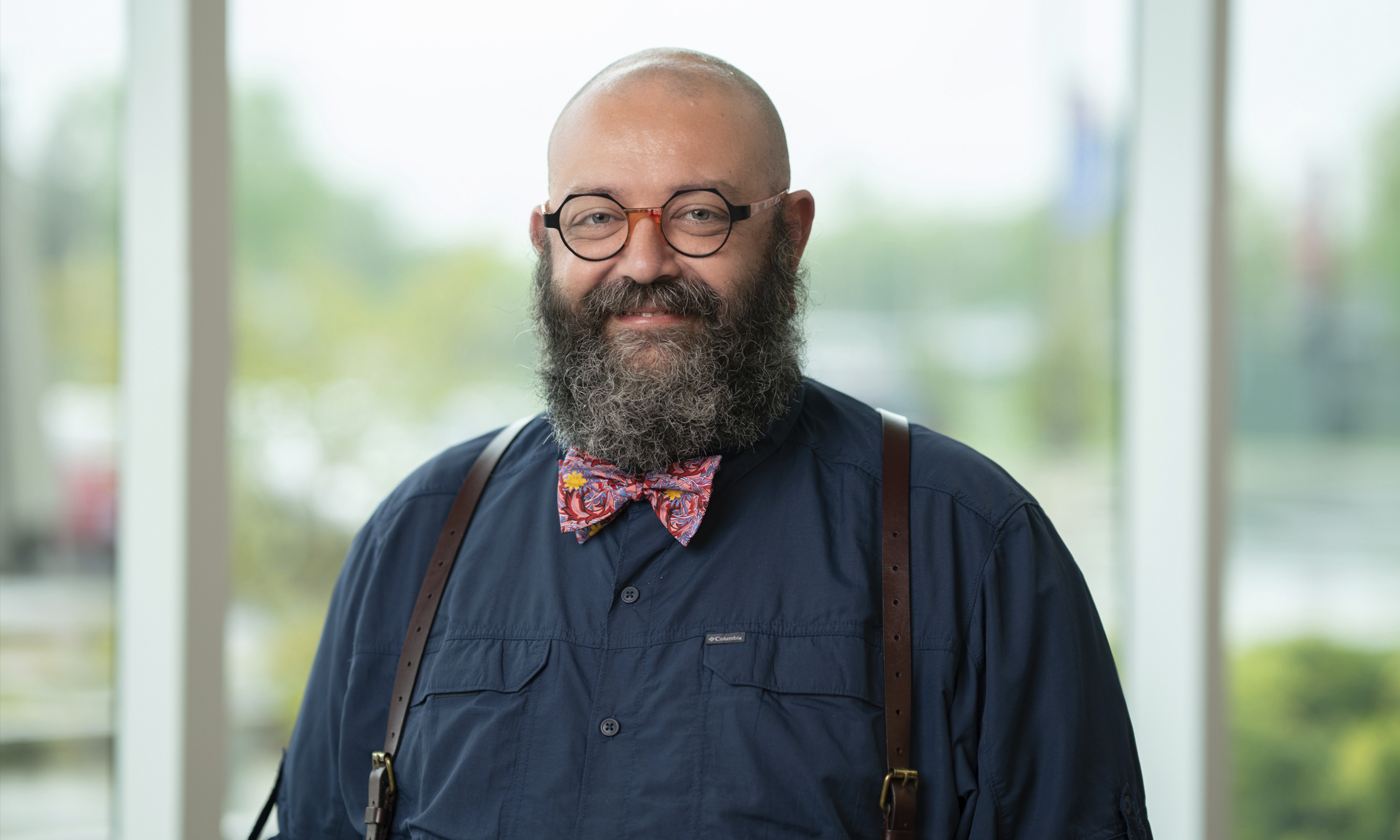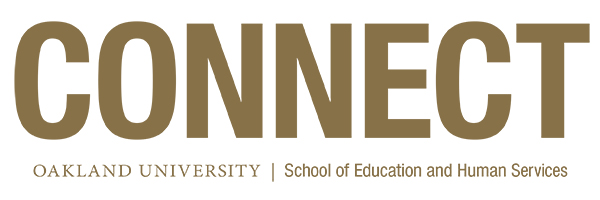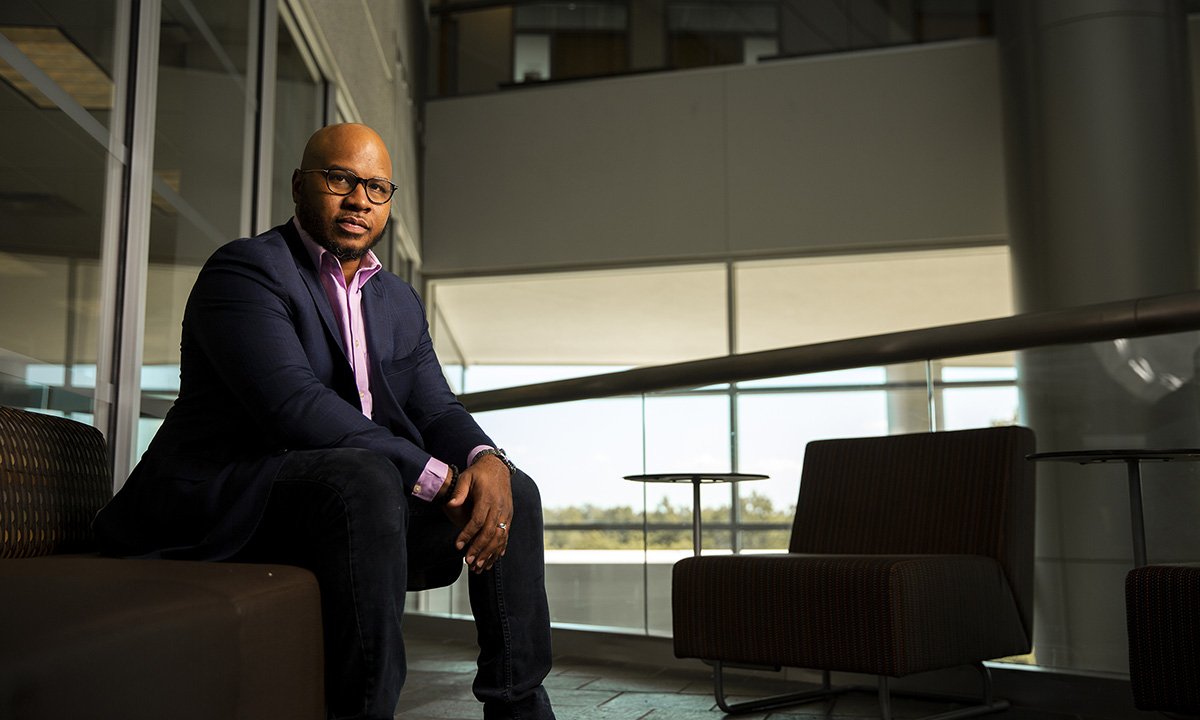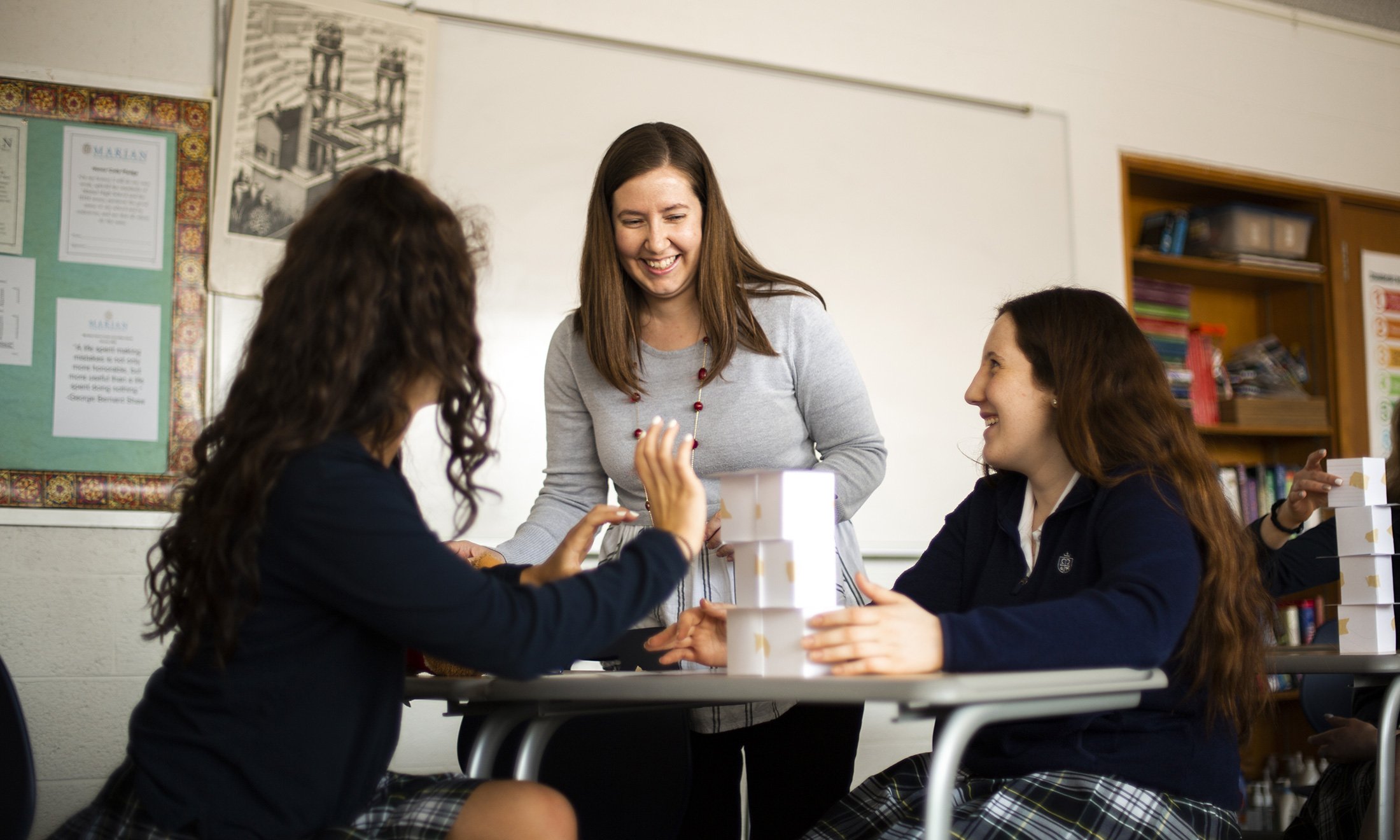Striking a Chord
Two-time music education alumnus combines music and technology to help students find their voice in the classroom and beyond.

Through a combination of constructivist theory and innovative technology, Michael Medvinsky encourages his students to be forward thinkers in all they do, both inside and outside the classroom. (Photo Credit: John Martin)
For Mike Medvinsky, the prospect of teaching has always been music to his ears.
“The choice was easy,” he said of his decision to pursue a music education degree from Oakland University. “The student-centered approach of teaching that I was studying in the music education program as I was performing in many large and small ensembles made me feel whole.”
Medvinsky is a two-time Oakland University alumnus, earning bachelor’s and master’s degrees in music education in 2005 and 2017, respectively. While music has been a passion of his for most of his life, it wasn’t until he met his future wife, Elizabeth — then a student in OU’s vocal music pedagogy graduate program — that he decided to uproot his career as a successful auto design engineer in pursuit of a life as a music educator.
A native of the small Eastern European country of Moldova, Medvinsky is no stranger to rearranging his entire life — he and his family migrated to Michigan when he was only four years old — so what may have seemed like an abrupt career transition for some felt very natural for him.
“I have always needed to create and perform music to express [myself], and looked for an opportunity to help children develop the skills to do the same,” he said. “I found a place where I not only belonged, but was thriving as a performer and learner.”
During his time at OU, Medvinsky participated in a wide variety of extracurricular activities to bolster his passion for music, including steel band, low brass ensemble, pep band and the campus radio station, WXOU. He was also involved with the National Association of Music Education and eventually served as a teacher mentor through Leadership OU, an on-campus initiative that connects undergraduate students to successful alumni in their fields of study. He completed his student teaching through Clarkston Community Schools, facilitating three concert bands, marching band and jazz band, and establishing a low brass ensemble.
Nowadays, Medvinsky credits those experiences and the acceptance of non-traditional learning methods within the music education program as crucial components in his career preparation.
“New experiences lead to new ideas,” he said. “What I learned about the ways learners experience the world through music prepared me for facilitating music programs in the schools which succeeded my time at OU.”
Constructivism — a theory centered on the idea that learners construct their own knowledge based on their experiences, rather than simply absorbing information — is at the forefront of Medvinsky’s own teaching methods. Much of this, he said, derived from “Teaching for Musical Understanding,” a constructivist approach designed by Jackie Wiggins, founding director of the School of Music, Theatre and Dance (SMTD), that serves as a core foundation for OU’s music education program.
“‘Teaching for Musical Understanding’ … created organic experiences for collaboration and leadership in music classes, as well as ensembles I was performing with,” he said. “Experiencing learning in this way, modeled by my professors, was the scaffolding I needed to learn to be a constructivist teacher myself.”
Like any musician, though, Medvinsky’s musical influences go beyond the classroom. The “highly improvisational” work of American rock band Phish — whom he has seen perform live more than 40 times — played a huge role in his decision to pursue a career in music.
“Every time I see a [Phish] show, it’s like attending a master class,” he said. “There is a spontaneity about their music that speaks to me and translates into my teaching.”
The group’s uniquely extemporized music style is something Medvinsky regularly encourages in his own classes.
“Phish created a culture in their band’s live performances, where each note from each band member matters and collectively creates beautiful music,” he said. “[... Likewise] in my classroom, we ensure that each learner’s thinking, as well as the whole group, is valued, visible and a part of their everyday experience.”
For Medvinsky, one of his biggest goals as an educator is to help students “find their state of flow” in the classroom. In the early 2010s, he attended some of Harvard University’s Project Zero workshops, allowing him to explore his interest in author Ron Ritchhart’s research on “Cultures of Thinking” and “Making Thinking Visible.” These concepts ultimately shaped much of his classroom approach, which emphasizes learner agency, learners making meaning, the inquiry process and technology integration.
A self-identified “non-traditional thinker and learner,” Medvinsky has advocated for education to feel inclusive, regardless of how a student might learn and retain knowledge, since the beginning of his career. As a result of his experiences at OU, Medvinsky said he developed a “sensitivity” for non-traditional learners.
“OU embraced my own style of learning and created experiences for me to develop around this,” he said. “I strive to ensure that education is not standardized and that we focus on building skills in pursuit of understanding for all learners.”
One of the ways Medvinsky has avoided standardizing the way his students learn is through the integration of technology into his classes. Over the years, he said it became difficult to help students bring their musical ideas to fruition solely through traditional classroom instruments, like the xylophone or recorder. He began using them in tandem with instruments that could help his students achieve a more contemporary sound, including guitars, bass guitars, synthesizers, drum sets, iPad apps, noise generators, microphones, amplifiers and mixing boards.
According to Medvinsky, providing a strong emphasis on technology in his courses has allowed his students to experience the “authentic processes of … today’s musician.” He often sets his students’ learning space up to resemble a recording studio, complete with an interactive whiteboard and stations for students to mix their music and connect their instruments and iPads.
“Blurring the boundaries of what some have labeled ‘school’ music and ‘real’ music, technology has been a tool to heal this divide,” he said. “Composing and performing musician/learners’ original music was the catalyst for my continued work to redefine what music education could be and create that culture in my classrooms.”
Soon enough, other teachers — both within and outside of arts education — began to take interest in Medvinsky’s technology integration in the classroom. He found himself assisting teachers with everything from coding robots to creating websites, movies and trailers. These experiences supported his views on constructivism and the understanding that “developing knowledge occurs best through making and building things that are tangible and shareable.”
However, while he’s always excited at the prospect of modernizing his coursework with new technology, he recognizes the importance of bringing it back to basics.
“Forming insights, constructing questions, making connections, considering different viewpoints and encouraging a sense of wonder are some concepts that carry our thinking forward,” he said. “There is no app for that.”
Currently, Medvinsky serves as the dean of pedagogy and innovation at University Liggett School in Grosse Pointe Woods. In his role, much of his focus centers on learner engagement and classroom culture. He also leads the school’s Center for Innovative Teaching and Learning (CITL), which gives faculty the opportunity to present the school’s best practices to other educators.
He hasn’t strayed too far from his roots, though. By his own admission, Medvinsky’s family “bleeds black and gold” — his wife, Elizabeth, is the director of OU Community Music, and both of her parents taught at OU. Medvinsky has also served as a special lecturer in music technology for SMTD and now teaches Technology for Teacher Leadership in the Master of Education in Teacher Leadership program.
Medvinsky’s illustrious career has comprised an abundance of awards — including the honors of 2012 Oakland County Elementary Teacher of the Year and 2013 State of Michigan Teacher of the Year runner-up, as well as OU’s 2014 Outstanding Young Alumni Award — and a plethora of publications in various academic journals. However, as far as he’s concerned, having the spotlight on him has never defined what he does.
“I have never had the goal to create the next generation of famous musicians,” he said. “[I would] rather equip people with the ability to create music that evokes feelings, as well as an avenue to communicate with others.”
If there’s one thing Medvinsky aims for his students to take from his classes, it’s the idea that “their voice matters, [and] their ideas are important and have the disposition of taking initiative.” Much of his classes concentrate on creativity and curiosity over classroom conventions, a lesson he hopes will stay with them, regardless of what their future may hold.
“I would like for learners to find joy in learning and growing ideas most of all, to know that they are capable,” he said. “In my classroom, creating new questions is more valuable than learning old answers.”
For additional information on the teacher education programs available at OU, visit oakland.edu/teach.

 August 10, 2022
August 10, 2022 By Trevor Tyle
By Trevor Tyle

